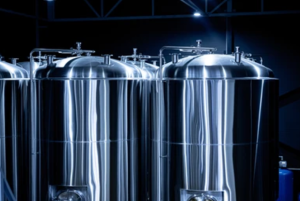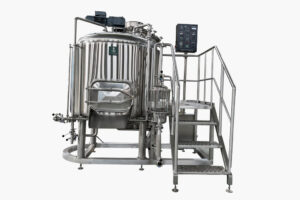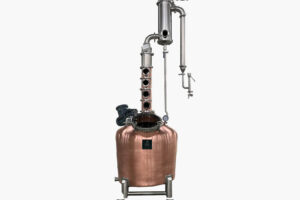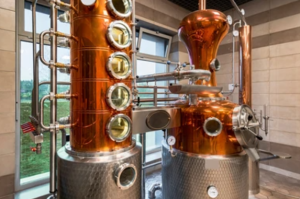COPYRIGHT © 2022 NingBo COFF Machinery Co., ltd. ALL RIGHTS RESERVED
Menu
Categories

Choosing the right fermentation tank is crucial for your home brewing success. The right tank ensures your beer ferments properly, enhancing flavor and quality. You want a tank that suits your brewing style and needs. Among the many options, COFF stands out as a top choice. Known for their high-quality brewery fermentation tanks, COFF offers durability and efficiency. Their tanks help you achieve the best results in your brewing journey. Trusting a reliable brand like COFF can make all the difference in your home brewing experience.
Key Takeaways
- Choosing the right fermentation tank is essential for achieving optimal flavor and quality in your homebrew.
- COFF fermentation tanks are highly recommended for their durability and advanced features, making them a reliable choice for serious brewers.
- Conical fermenters simplify the brewing process by allowing for easy cleaning and yeast harvesting, enhancing the quality of your beer.
- Fermentation chambers provide precise temperature control, which is crucial for producing high-quality beer and avoiding fermentation issues.
- Plastic fermenters are budget-friendly and ideal for beginners, while stainless steel options offer long-term durability and better temperature management.
- DIY fermentation tanks can be a cost-effective and customizable solution, but require careful assembly to avoid contamination.
- Investing in premium fermentation tanks can elevate your brewing experience, providing advanced features that lead to superior results.
Understanding Brewery Fermentation Tanks
What Are Fermentation Tanks?
Fermentation tanks, also known as fermentation vessels, are specialized containers designed to facilitate the fermentation process. You might wonder why these tanks are so crucial in brewing. Well, they provide an optimal environment for fermentation microbes to convert sugars into alcohol and other by-products. This transformation is essential in producing alcoholic beverages like beer and wine.
These tanks come in various sizes and materials, with stainless steel and food-grade plastic being the most common. For homebrewing, smaller tanks are often preferred because they are easier to manage. However, even a humble home-based brewery relies on these tanks to store wort and ferment it into beer. The right tank can make a significant difference in your brewing results.
Role of Fermentation Tanks in Homebrewing
In homebrewing, fermentation tanks play a pivotal role. They ensure that your beer ferments properly, which directly impacts the flavor and quality of your brew. You need a tank that suits your brewing style and needs. The size of the tank can influence the fermentation process. Larger tanks are typically used for commercial production, while smaller ones are ideal for craft brewers and home winemakers.
When you choose a fermentation tank, consider the type of yeast you’ll use. Different yeasts can ferment different products. For instance, brewer’s yeast converts wort into beer by transforming sugar into alcohol. This process requires anaerobic conditions, meaning the tank must be closed to limit oxygen exposure. This setup ensures that more sugar converts into alcohol, enhancing the beer’s quality.
Selecting the right fermentation tank is crucial for your homebrewing success. It helps you achieve the best results in your brewing journey. Trusting a reliable brand like COFF can make all the difference. Known for their high-quality brewery fermentation tanks, COFF offers durability and efficiency, ensuring your beer ferments to perfection.
Conical Fermenters
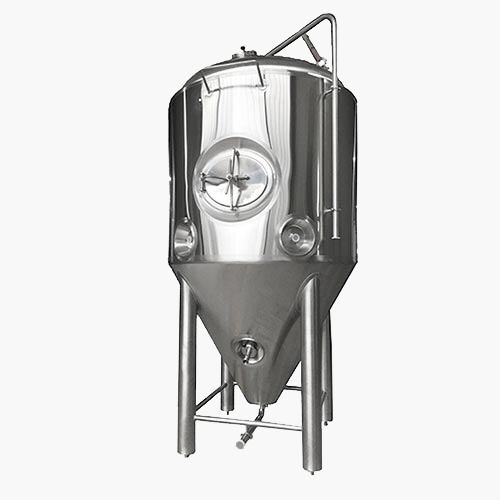
Conical fermenters have become a favorite among homebrewers. Their unique design offers several benefits that can enhance your brewing experience. Let’s dive into what makes these fermenters stand out.
Advantages of Conical Fermenters
Conical fermenters bring a lot to the table. First, they make cleaning a breeze. The smooth surfaces and cone-shaped bottom allow you to easily remove yeast and sediment, known as trub. This feature minimizes the risk of infection or oxidation, which can spoil your brew. You can also perform both primary and secondary fermentation in one vessel, simplifying the process.
Another perk is the built-in valves and racking arms. These components let you transfer beer without disturbing the sediment. This means clearer beer with less effort. Plus, you can harvest yeast for future batches, saving you money and time. If you’re serious about homebrewing, a conical fermenter can be a game-changer.
Disadvantages of Conical Fermenters
Despite their benefits, conical fermenters have some downsides. They tend to be pricier than other options like carboys or bucket-style fermenters. This might be a hurdle if you’re on a tight budget. Also, they can take up more space, which could be an issue if your brewing area is limited.
Some homebrewers find the setup a bit complex. The additional valves and fittings require careful handling to prevent leaks. However, once you get the hang of it, these challenges become manageable. Weighing these factors will help you decide if a conical fermenter suits your needs.
Best Conical Fermenters for Home Brewers
When it comes to choosing the best conical fermenters, you have plenty of options. Plastic conical fermenters are affordable and easy to clean. They let you visually track fermentation progress, which is handy for beginners. Some models even come with mounting hardware for wall hanging, saving you space.
On the other hand, stainless steel conical fermenters offer durability and better temperature control. They are ideal if you’re looking for a long-term investment. Brands like COFF provide high-quality stainless steel options that ensure your beer ferments perfectly. Their reputation for durability and efficiency makes them a top choice for serious homebrewers.
Fermentation Chambers
Fermentation chambers are a game-changer for homebrewing enthusiasts. They offer precise control over the fermentation environment, which is crucial for producing high-quality beer. Let’s explore why these chambers are so beneficial and what you should consider when choosing one.
Benefits of Using Fermentation Chambers
Temperature Control: One of the biggest advantages of a fermentation chamber is its ability to maintain a consistent fermentation temperature. This consistency ensures that your yeast performs optimally, leading to better flavor and aroma in your beer. You can avoid the common pitfalls of under- or over-fermentation, which can ruin a batch.
Versatility: Many fermentation chambers allow you to control not just temperature but also light exposure. This versatility means you can experiment with different brewing styles and recipes without worrying about environmental factors affecting your brew.
Improved Quality: By using a fermentation chamber, you can achieve a more refined and consistent product. The controlled environment reduces the risk of contamination and off-flavors, giving you a cleaner and more professional-tasting beer.
Drawbacks of Fermentation Chambers
Cost: Fermentation chambers can be an investment. While they offer many benefits, the initial cost might be a barrier for some homebrewers. However, considering the long-term advantages, many find it a worthwhile expense.
Space Requirements: These chambers can take up significant space in your brewing area. If you have limited room, you might need to get creative with your setup or consider smaller models.
Complexity: Setting up and maintaining a fermentation chamber requires some technical know-how. You need to understand how to adjust settings and troubleshoot any issues that arise. But once you get the hang of it, the process becomes much easier.
Top Fermentation Chambers for Home Use
When selecting a fermentation chamber, consider your specific needs and budget. Here are some popular options:
DIY Fermentation Chambers: If you’re handy, you might consider building your own chamber. Options like the swamp cooler, Son of Fermentation Chiller, and modified chest freezers are popular among DIY enthusiasts. These setups can be cost-effective and tailored to your exact specifications.
Commercial Fermentation Chambers: For those who prefer a ready-made solution, commercial chambers offer convenience and reliability. They come with features like digital temperature controls and built-in cooling systems. Brands like COFF provide high-quality options that ensure your brewery fermentation tanks operate at peak efficiency.
Multi-Function Chambers: Some advanced models offer additional features like humidity control and programmable settings. These are ideal for brewers who want to experiment with different styles and need precise environmental control.
Choosing the right fermentation chamber can elevate your homebrewing experience. Whether you opt for a DIY project or a commercial model, the benefits of consistent and controlled fermentation are undeniable.
Plastic Fermenters
Plastic fermenters are a popular choice among home brewers, especially those just starting out. They offer a range of benefits that make them an attractive option for many.
Pros of Plastic Fermenters
Affordability: Plastic fermenters are the most budget-friendly option available. You can find basic bucket-style fermenters starting as low as $20. This makes them perfect for beginners who want to try their hand at brewing without a significant investment.
Lightweight and Portable: These fermenters are easy to move around, which is great if you have limited space or need to transport your brew. Their lightweight nature means you can easily handle them even when full.
Variety of Options: Plastic fermenters come in various sizes and designs, including conical shapes. Some models, like the FastFerment Conical Fermenter, offer features such as wall mounting, which saves floor space and keeps your setup organized.
Ease of Use: Many plastic fermenters have clear sides, allowing you to monitor the fermentation process visually. This feature is particularly useful for beginners who want to learn and understand the stages of fermentation.
Cons of Plastic Fermenters
Durability Concerns: Plastic is more prone to scratches compared to stainless steel. Scratches can harbor bacteria, which might spoil your beer. You need to handle and clean them carefully to avoid this issue.
Limited Lifespan: Over time, plastic can absorb odors and stains, which might affect the flavor of your beer. Regular maintenance and proper cleaning can help mitigate this, but it’s something to keep in mind.
Temperature Sensitivity: Plastic fermenters may not offer the same level of temperature control as stainless steel options. If precise temperature management is crucial for your brewing process, you might need a fermentation cooler to maintain optimal conditions.
Recommended Plastic Fermenters
FermZilla: This fermenter is a fantastic choice if you want to ferment under pressure. It’s pressure-rated up to 35 psi, allowing for pressure transfers from fermenter to keg. The clear plastic design lets you track fermentation progress easily.
FastFerment Conical Fermenter: Known for its affordability, this fermenter offers the benefits of conical fermentation for under $100. It includes mounting hardware, so you can hang it on your wall, saving space and keeping your brewing area tidy.
Basic Bucket Fermenters: For those on a tight budget, basic bucket-style fermenters are available starting at $20. They are simple to use and perfect for small batches.
Plastic fermenters provide an excellent entry point into home brewing. They offer flexibility and ease of use, making them ideal for beginners. As you gain experience, you might consider upgrading to more advanced options like stainless steel or COFF’s high-quality brewery fermentation tanks for enhanced durability and efficiency.
Stainless Steel Fermenters
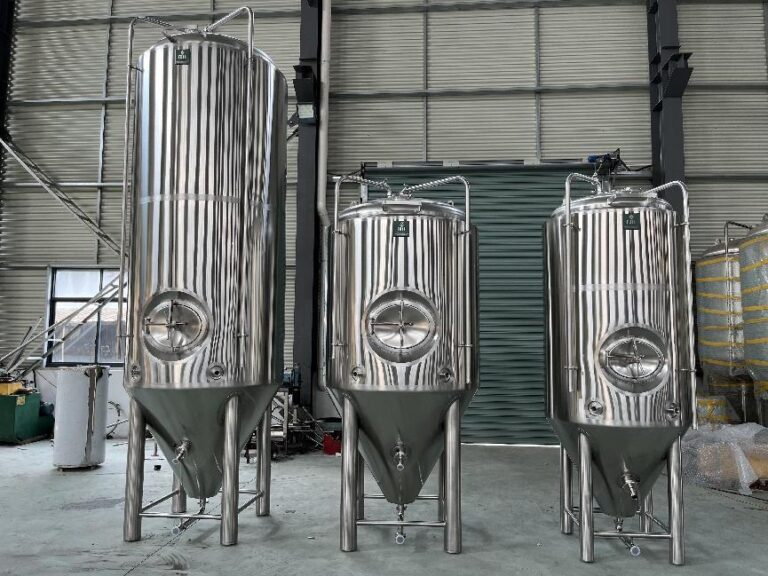
Stainless steel fermenters are a top choice for many home brewers. They offer a blend of durability, efficiency, and ease of use that can elevate your brewing experience. Let’s explore why these fermenters might be the perfect fit for your home brewery.
Advantages of Stainless Steel Fermenters
Durability: Stainless steel fermenters are built to last. They resist scratches and dents, ensuring a long lifespan. This durability means you won’t need to replace them frequently, saving you money in the long run.
Ease of Cleaning: Cleaning is a breeze with stainless steel. The smooth surface prevents bacteria from hiding in scratches, reducing the risk of contamination. You can sanitize them easily, ensuring your brew stays pure and delicious.
Temperature Control: Many stainless steel fermenters come with advanced temperature control features. This allows you to maintain a steady fermentation temperature, which is crucial for producing high-quality beer. Brands like Ss BrewTech offer models with built-in cooling systems for precise control.
Versatility: These fermenters often include features like conical bottoms and built-in valves. This design allows you to dump trub, harvest yeast, and even carbonate your beer in one vessel. The versatility makes them a favorite among serious brewers.
Disadvantages of Stainless Steel Fermenters
Cost: Stainless steel fermenters can be more expensive than plastic options. The initial investment might be higher, but the benefits often outweigh the cost for dedicated brewers.
Weight: These fermenters are heavier than their plastic counterparts. Moving them around can be challenging, especially when full. Consider your brewing space and setup before purchasing.
Complexity: Some models come with additional features that require a bit of a learning curve. You’ll need to familiarize yourself with the setup and maintenance to get the most out of your fermenter.
Best Stainless Steel Fermenters for Home Brewing
When it comes to choosing the best conical fermenters, stainless steel options stand out. Here are some top picks:
Ss BrewTech Chronical Fermenter: Known for its advanced temperature control and efficient design, this fermenter is perfect for home brewers looking for precision. It offers a conical bottom for easy trub removal and yeast harvesting.
COFF Stainless Steel Fermenters: COFF provides high-quality stainless steel fermenters that ensure your beer ferments perfectly. Their reputation for durability and efficiency makes them a top choice for serious home brewers.
Blichmann Fermenator: This fermenter offers a sleek design with a conical bottom and built-in valves. It’s ideal for those who want a professional-grade fermenter at home.
Choosing the right stainless steel fermenter can significantly impact your brewing results. Whether you’re a beginner or an experienced brewer, investing in a quality fermenter will enhance your brewing journey.
Glass Carboys
Benefits of Glass Carboys
Glass carboys have long been a staple in the homebrewing community. You might wonder why so many brewers choose them. Here are some reasons:
Clarity: Glass carboys let you see the fermentation process. You can easily monitor the progress without opening the vessel. This transparency helps you spot any issues early on.
Non-porous Surface: Unlike plastic, glass doesn’t absorb odors or flavors. Your beer remains pure, batch after batch. This feature ensures that your brew tastes exactly as intended.
Ease of Cleaning: Cleaning glass is straightforward. The smooth surface prevents bacteria from hiding in scratches. You can sanitize it effectively, reducing the risk of contamination.
Temperature Control: With innovations like the CoolStix by BrewBuilt, you can turn any glass carboy into a temperature-controlled vessel. This flexibility allows you to maintain optimal fermentation conditions.
Limitations of Glass Carboys
While glass carboys offer many benefits, they also come with some drawbacks. It’s important to consider these before making a decision:
Fragility: Glass is fragile. You need to handle carboys with care to avoid breakage. Dropping one can lead to a mess and potential injury.
Weight: Glass carboys are heavier than plastic alternatives. Moving them around, especially when full, can be challenging. You might need assistance or special equipment to transport them safely.
Cost: Although not the most expensive option, glass carboys can be pricier than basic plastic fermenters. If you’re on a tight budget, this might be a consideration.
Top Glass Carboys for Home Brewers
If you decide that glass carboys are right for you, here are some top picks to consider:
Standard Glass Carboys: These are the classic choice for many homebrewers. They come in various sizes, typically ranging from 3 to 6 gallons. Their simplicity and effectiveness make them a reliable option.
BrewBuilt Glass Carboys: Known for their quality, these carboys are compatible with the CoolStix system. This feature allows you to control fermentation temperature, enhancing your brewing results.
Wide-Mouth Glass Carboys: These offer easier access for cleaning and adding ingredients. The wide opening simplifies the process, making them a favorite among brewers who like to experiment with different flavors.
Choosing the right glass carboy can enhance your homebrewing experience. Whether you prioritize clarity, flavor purity, or ease of cleaning, glass carboys provide a solid foundation for crafting delicious beer.
DIY Fermentation Tanks
Creating your own fermentation tank can be a rewarding project. It allows you to customize your brewing setup and save money. Let’s explore how you can craft a DIY fermentation tank and weigh the pros and cons of this approach.
How to Create a DIY Fermentation Tank
Building a DIY fermentation tank might sound daunting, but it’s quite manageable with the right materials and tools. Here’s a simple guide to get you started:
Choose Your Container: Start with a food-grade plastic bucket or a glass carboy. These are affordable and readily available. Ensure the container is large enough for your brewing needs.
Add an Airlock: Drill a hole in the lid of your container to fit an airlock. The airlock allows carbon dioxide to escape while preventing contaminants from entering. You can find airlocks at most brewing supply stores.
Seal the Lid: Use a rubber grommet or silicone sealant to ensure the lid is airtight. This step is crucial to maintain the anaerobic environment needed for fermentation.
Temperature Control: Consider adding a temperature strip or probe to monitor fermentation temperatures. You can also use a modified cooler or fridge to regulate the temperature if needed.
Sanitize Everything: Before using your DIY tank, sanitize all components thoroughly. This step prevents contamination and ensures a successful fermentation process.
Pros and Cons of DIY Options
DIY fermentation tanks offer several benefits, but they also come with some challenges. Here’s what you need to consider:
Pros:
- Cost-Effective: DIY tanks are often cheaper than commercial options. You can use materials you already have or find affordable supplies at local stores.
- Customization: You have the freedom to design a tank that fits your specific brewing needs. Whether you want a particular size or additional features, you can tailor your setup accordingly.
- Learning Experience: Building your own tank enhances your understanding of the brewing process. You’ll gain valuable skills and knowledge that can improve your brewing results.
Cons:
- Time-Consuming: Creating a DIY tank requires time and effort. You’ll need to gather materials, assemble the tank, and troubleshoot any issues that arise.
- Potential for Errors: Without the precision of commercial manufacturing, there’s a risk of leaks or contamination. Careful assembly and thorough testing are essential to avoid these problems.
- Limited Features: DIY tanks may lack advanced features like built-in temperature control or pressure capabilities. If these are important to you, a commercial tank might be a better option.
Budget-Friendly Fermentation Tanks
When you’re diving into home brewing, finding the right fermentation tank without breaking the bank is crucial. You want a tank that fits your budget but still delivers quality results. Let’s explore some affordable options and how to balance cost with quality.
Affordable Fermentation Tanks
Plastic Bucket Fermenters: These are the go-to choice for many beginners. They’re cheap, easy to use, and perfect for small batches. You can find them for as low as $20. They might not have all the bells and whistles, but they get the job done.
Glass Carboys: If you prefer something a bit more durable, glass carboys are a solid option. They offer clarity and don’t absorb odors. While slightly more expensive than plastic, they provide a great balance between cost and quality.
DIY Options: Feeling crafty? You can build your own fermentation tank using food-grade containers. This approach saves money and lets you customize your setup. Just make sure everything is sanitized to avoid contamination.
Variable Capacity Fermenting Tanks: These tanks adjust to the volume of your brew, making them versatile and cost-effective. They work well for different batch sizes, so you don’t need multiple tanks.
Balancing Cost and Quality
Finding the right balance between cost and quality is key. Here are some tips to help you make the best choice:
Prioritize Your Needs: Think about what features are most important to you. Do you need temperature control, or is a basic setup enough? Knowing your priorities helps you avoid overspending on unnecessary features.
Consider Long-Term Use: Sometimes spending a bit more upfront saves money in the long run. Durable materials like stainless steel might cost more initially but last longer and offer better performance.
Look for Deals: Keep an eye out for sales or second-hand options. Many home brewers upgrade their equipment and sell their old tanks at a discount. You can find great deals if you’re patient.
Trust Reliable Brands: Brands like COFF offer high-quality tanks at competitive prices. Investing in a reputable brand ensures you get a product that performs well and lasts.
Choosing a budget-friendly fermentation tank doesn’t mean compromising on quality. By considering your needs and exploring different options, you can find a tank that fits your budget and enhances your brewing experience.
Premium Fermentation Tanks
When you dive into the world of home brewing, you might wonder if investing in premium fermentation tanks is worth it. These high-end tanks offer features that can elevate your brewing experience to a professional level. Let’s explore what makes these tanks stand out and whether they justify the investment.
Features of High-End Fermentation Tanks
Premium fermentation tanks come packed with advanced features that cater to serious brewers. Here are some key aspects that set them apart:
Temperature Regulation: High-end tanks often include sophisticated cooling systems. These systems allow you to maintain precise temperature control, which is crucial for optimal fermentation. Consistent temperatures ensure that your yeast performs at its best, leading to superior flavor and aroma in your beer.
Durability and Material Quality: Most premium tanks are made from stainless steel. This material offers unmatched durability and non-reactivity, ensuring that your brew remains pure. Stainless steel tanks resist scratches and dents, providing a long-lasting solution for your brewing needs.
Advanced Monitoring Systems: Many high-end tanks feature sensors and automation systems. These tools let you monitor fermentation progress, pH levels, and other critical parameters in real-time. This level of control helps you make informed decisions during the brewing process.
Ease of Cleaning: Premium tanks are designed for easy cleaning and sanitization. The smooth surfaces prevent bacteria from hiding, reducing the risk of contamination. This feature is vital for maintaining the quality of your brew.
Versatility: Some high-end tanks offer multifunctional capabilities. They can aid in fermentation, maturation, and storage, providing a comprehensive solution for your brewing process.
Are Premium Tanks Worth the Investment?
Deciding whether to invest in a premium fermentation tank depends on your brewing goals and budget. Here are some points to consider:
Enhanced Brewing Experience: If you’re passionate about brewing and want to achieve the best possible results, a premium tank can make a significant difference. The advanced features and precise control can elevate your brew to a professional standard.
Long-Term Savings: While the initial cost might be higher, premium tanks often save you money in the long run. Their durability means you won’t need to replace them frequently. Plus, the ability to monitor and control fermentation can reduce the risk of spoiled batches.
Brand Reliability: Investing in a reputable brand like COFF ensures you get a high-quality product. COFF’s premium tanks offer durability and efficiency, making them a top choice for serious home brewers.
Personal Satisfaction: For many brewers, the joy of crafting a perfect brew is worth the investment. If brewing is more than just a hobby for you, a premium tank can enhance your satisfaction and pride in your creations.
COFF Fermentation Tanks
When it comes to choosing the right fermentation tank for your home brewing needs, COFF Fermentation Tanks stand out as a top choice. Let’s explore why COFF is a preferred brand among home brewers and discover some popular models that could enhance your brewing experience.
Why Choose COFF?
Quality Craftsmanship: COFF specializes in designing high-quality stainless steel fermentation tanks. These tanks are durable and long-lasting, ensuring you get the most out of your investment. You won’t have to worry about frequent replacements or repairs.
Advanced Features: COFF tanks come equipped with advanced features like cooling systems, digital monitoring, and automated controls. These features provide you with precise control over the fermentation process, leading to better-tasting beer.
Versatility: Whether you’re brewing beer, wine, or even experimenting with other beverages, COFF tanks offer versatility. Their tanks are used in various industries, including beverage production, pharmaceuticals, and chemical manufacturing, showcasing their adaptability.
Variety of Options: COFF offers tanks in various shapes and sizes, catering to different brewing needs. Whether you’re a beginner or an experienced brewer, you’ll find a tank that fits your requirements.
Reputation and Reliability: With a strong reputation in the industry, COFF is known for its reliable products. Choosing COFF means trusting a brand that has consistently delivered quality and efficiency.
Popular COFF Models for Home Brewers
COFF Mini Brewmaster Series: Perfect for home brewers, this series offers compact tanks with all the essential features. You get the benefits of a professional-grade tank in a size that’s manageable for home use.
COFF Pro Brew Series: For those looking to take their brewing to the next level, the Pro Brew Series provides larger tanks with enhanced features. These tanks are ideal for serious brewers who want to experiment with different styles and recipes.
COFF All-in-One Fermenter: This model combines multiple functions into one tank, allowing you to ferment, carbonate, and store your brew. It’s a convenient option for those who want to streamline their brewing process.
COFF Customizable Tanks: If you have specific requirements, COFF offers customizable tanks. You can choose the size, features, and design that best suit your brewing style.
Choosing a COFF fermentation tank can significantly enhance your home brewing experience. With their quality craftsmanship, advanced features, and variety of options, COFF tanks provide everything you need to brew delicious beer at home.
Choosing the right fermentation tank is crucial for your home brewing success. You need to consider your brewing style, budget, and space. For beginners, affordable conical fermenters offer a great start with their ease of use and efficiency. As you advance, investing in high-quality options like COFF fermentation tanks can enhance your brewing experience. COFF stands out for its durability and advanced features, making it a reliable choice for serious brewers. Trusting a reputable brand ensures you get the best results in your brewing journey.
FAQ
What are fermentation tanks?
Fermentation tanks, also known as fermentation vessels, store wort and transform it into beer. You can use almost any container that holds liquid as a potential fermenter. By using different yeasts, you can ferment various products. Brewer’s yeast, for example, converts wort into beer by turning sugar into alcohol. Oxygen levels play a crucial role in this process.
What are fermentation tanks used for?
You can use stainless steel fermentation tanks to ferment drinks like beer, wine, cider, and spirits. COFF Machinery offers versatile tanks suitable for both home brewing and commercial production. These tanks feature simple designs, making them easy to fill and empty.
Why are fermentation tanks important?
Fermentation tanks are vital because they are easy to clean and sanitize. This prevents contamination from unwanted microorganisms that could spoil your beer. Keeping your tank clean ensures the quality and safety of your brew.
What are the key features of fermenting tanks?
Fermentation tanks are central to brewing, winemaking, and distilling. They come in various types, each pivotal to different fermentation-based industries. Choosing the right tank depends on your specific fermentation needs and budget.
What factors should you consider when selecting a fermentation tank?
When choosing a fermentation tank, consider material, design, and features. Stainless steel tanks are durable, easy to clean, and inert, meaning they don’t interact with the fermenting liquid. Features like cooling jackets, sample ports, and racking valves enhance functionality and ease of use.
Are fermentation tanks used the same way in breweries and distilleries?
Fermentation tanks in breweries may differ from those in distilleries. The right tank depends on the specific requirements of your production process. Understanding these differences helps you select the best tank for your needs.
Why are fermenting tanks essential for brewing and winemaking?
Fermenting tanks are crucial for brewing beer, making wine, and fermenting other beverages and food items. By understanding the different types and materials, you can choose the right tank to ensure a successful fermentation process.
How does COFF stand out in the fermentation tank market?
COFF stands out by offering high-quality stainless steel fermentation tanks with advanced features. Their tanks provide durability and efficiency, making them a reliable choice for serious home brewers. Trusting COFF ensures you get the best results in your brewing journey.

